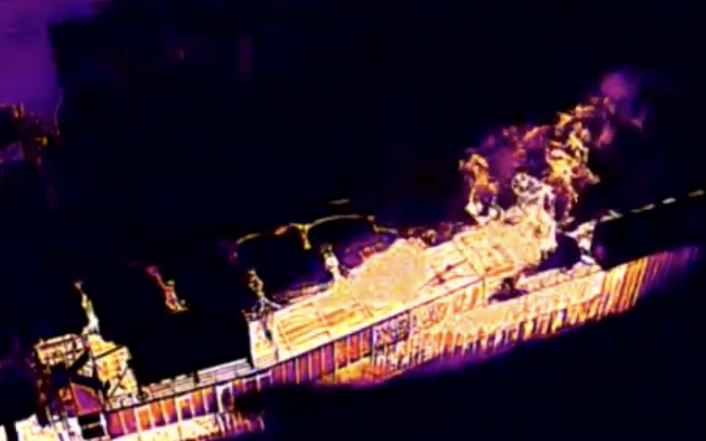A week of public testimony on the fatal ship fire July 5, 2023 at Port Newark, N.J., concluded Thursday, but a joint panel of Coast Guard and National Transportation Safety Board investigators will continue follow-up interviews with additional witnesses.
Coast Guard Cmdr. Christian J. Barger, the board chair, said investigators still have weeks of fact-finding and analysis ahead of them. The fire killed Newark Fire Department captains Augusto ‘Augie’ Acabou and Wayne ‘Bear’ Brooks Jr. as they tried to make their way out of a smoke-filled desk full of vehicles on the Italian-flagged 692’x118’ ro/ro container vessel Grande Costa d’Avorio.
On the last day of their hearing at Union, N.J., investigators heard from U.S. Navy Dr. Bryan Platt, a U.S. military medical examiner who consulted on results from autopsies of Acabou and Brooks. Platt said the evidence showed both men died of carbon monoxide toxicity. Neither firefighter showed evidence of burns or blast injuries, a question raised by surviving firefighters’ descriptions of the fire.
The daily proceedings were livestreamed to viewers online, and Barger said he believes the testimonies offered by witnesses could help port operators and maritime interests across the U.S. in thinking about their own emergency planning and training.
Early findings from the investigation led the Coast Guard to issue a Nov. 20 marine safety alert, noting that city firefighters at Port Newark “had little to no maritime firefighting training, experience, or familiarization with cargo ships of any type. Unfortunately, this is only one of several vessel fires occurring within the last five years where the lack of familiarity with commercial vessels and inexperience with shipboard firefighting techniques unduly endangered the safety of responding personnel.”
During the hearings Newark firefighters testified that they had no prior experience or formal training for fighting shipboard fires. The board’s last witness, Virginia marine emergency and firefighting expert William Burket Jr., offered his analysis of what may have gone wrong with the firefighting effort.
Burket served 31 years with the Virginia Beach Fire Department, retiring as captain in 2010, and since then has been director of the maritime incident response team at the Port of Virginia. From his review of the facts it was evident the Newark firefighters lacked marine firefighting training, said Burket.
Earlier testimony included accounts of difficulties closing a door to a vehicle deck, and heavy smoke despite an attempt to exhaust the decks using the ship’s ventilation system.
Incident commanders and firefighters must depend on a ship’s crew for help with the immediate response, Burket noted: “When we teach shipboard firefighting, we make the point that firefighters should no operate equipment they don’t know.”
When municipal fire departments have had previous contact with port operators and the various players – tugboats, stevedores, terminal operators and the rest – “it can be overwhelming” when they are called on for a fire response, said Burket. Burket said he and other marine emergency experts are working to organize a summit meeting to address that problem of familiarity and training opportunities.
“Our priority is to get the fire departments and port authorities involved,” he said.




